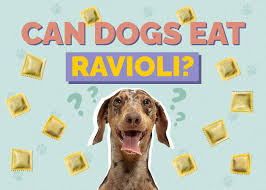Dogs frequently attempt to taste the meals that their human friends enjoy because they are known to have bewitching appetites. Pasta dish ravioli, renowned for its diverse components, is one such enticing dish. Sharing a bite of ravioli with your pet may seem innocent, but you should be aware of the potential consequences if dogs eat ravioli. Learn more about dog care.
High-fat cheeses, onions, and garlic are among the elements that can be detrimental to dogs while eating ravioli. They could also find it difficult to digest the pasta itself. For dogs’ health and well-being, it is essential to comprehend potential risks and know which meals are safe for them.
Nutritional Concerns
Ravioli, a beloved pasta dish filled with a variety of ingredients, can pose several nutritional concerns for dogs:
a. Cheese
Cheese can cause digestive problems, especially in dogs who are lactose intolerant, despite not being intrinsically harmful. It is also high in fat.
b. Meats
Meat fillings often contain high-fat and seasonings unsuitable for dogs, potentially causing digestive problems and other health issues.
c. Vegetables
Garlic and onions are frequent ingredients in ravioli, but they are toxic to dogs and can cause serious health problems.
d. Spices and Seasonings
Many ravioli recipes include spices and seasonings that can upset a dog’s stomach or cause more severe health problems.
e. Pasta
Due to its carbohydrate content, pasta could be more nutritious for dogs. However, if consumed in large quantities, it can cause digestive issues.
Harmful Ingredients
Many ravioli recipes include ingredients that are harmful to dogs:
a) Garlic and Onions
Garlic and onions, frequently used in sauces and fillings, are toxic to dogs and cause health problems, such as hemolytic anemia.
b) Spices and Seasonings
Ingredients like nutmeg, salt, and certain herbs can enhance the flavor of ravioli for humans but can upset a dog’s stomach and potentially cause more severe health problems.
c) Rich Sauces
Cream-based or tomato-based sauces often contain high levels of fat, salt, and sugar, which are detrimental to a dog’s health.
d) Preservatives
Store-bought ravioli may contain preservatives and artificial additives that can negatively affect a dog’s health.
e) High Sodium level
Many processed ravioli dishes have high sodium levels, which can lead to sodium ion poisoning in dogs.
High-Fat Content
Dogs frequently attempt to taste the meals that their human friends enjoy because they are known to have bewitching appetites. Pasta dish ravioli, renowned for its diverse components, is one such enticing dish. Dogs eat ravioli, and ravioli often contains high fat levels, mainly when it includes cheese or is cooked in oil or butter. A high-fat diet can quickly lead to health issues in dogs. Consuming fatty foods increases the risk of obesity, pancreatitis, and other severe conditions. Even a small amount of high-fat ravioli can trigger these problems in some dogs.
a) Cheese
High-fat cheeses contribute to rapid weight gain and obesity in dogs.
b) Cooking Oils and Butter
Cooking ravioli in oil or butter raises its fat content significantly.
c) Obesity Risk
Dogs can quickly become obese, leading to joint problems and heart disease.
d) Pancreatitis
Fatty foods can cause painful and dangerous pancreatitis, even in small amounts.
e) Digestive Issues
High-fat foods often result in digestive problems like diarrhea, vomiting, and discomfort.
Digestive problems
Dogs struggle to digest large quantities of pasta, which is not highly nutritious. Their digestive systems are not designed to process substantial amounts of carbohydrates, leading to various digestive problems.
a) Low Nutritional Value
Pasta does not provide the essential nutrients dogs need.
b) Carbohydrate Overload
Excessive carbs can overwhelm a dog’s digestive system.
c) Discomfort
Dogs may experience stomach discomfort after eating pasta.
d) Bloating
Consuming too much pasta can cause bloating in dogs.
e) Bowel Movement Changes
High carbohydrate intake can result in irregular or problematic bowel movemenT.
Exploring Dog-Friendly Treat Alternatives
When selecting treats for your dog, consider alternatives that prioritize their health and preferences:
a. Pet Store Options
Pet stores offer a variety of treats formulated with natural, dog-friendly ingredients such as lean meats, vegetables, and fruits. These options ensure both safety and nutritional value for your pet.
b. Homemade Treats
Making homemade sweets gives you complete control over the ingredients and flavor combinations. Dogs with allergies or sensitivities will benefit from this because common allergens and needless additives can be avoided.
c. Health and Wellness Benefits
Choose treats that promote dental health or provide joint support, contributing to your dog’s overall well-being with every indulgence.
d. Bonding through Treat Preparation
Preparing treats at home fosters a closer bond with your pet, offering a shared activity that reinforces positive interactions and strengthens your relationship.
What do you do if a dog eats ravioli?
If your dog consumes ravioli, swiftly check for harmful ingredients like onions, garlic, or excessive salt, which can be toxic. If symptoms appear or you have questions about the components, don’t hesitate to contact your veterinarian. Keep an eye out for symptoms of digestive discomfort, such as vomiting or diarrhea.
Depending on the situation, immediate veterinary attention may be necessary. To prevent future incidents, store human food securely and educate family members about the risks of feeding pets without knowledge of safe ingredients. Acting promptly and responsibly can safeguard your dog’s well-being after ingesting ravioli or any potentially harmful food.
Conclusion
Though ravioli is theoretically OK for dogs to eat, it’s not advised because of potentially dangerous ingredients like onions, garlic, or excessive salt. If you decide to serve your dog ravioli, ensure it is unseasoned and plain.
Still, sticking to nutritionally balanced, specially prepared dog food and treats is usually safer and healthier. To prevent any potential stomach upset or health problems, always speak with your veterinarian before adding new human food to your dog’s diet. Making educated decisions on your dog’s nutrition and food is a priority for their well-being.
